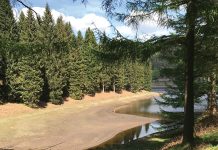Durham Wildlife Trust’s Heart of Durham Project, working in partnership with Northumbrian Water, has improved a natural habitat by reducing invasive bracken.
The organisations manage areas around Derwent Reservoir, including Pow Hill Heath on the south side of the reservoir which is a mid-altitude heath, a scarce habitat.
The site, which is designated as a Local Wildlife Site, supports a range of plants, reptiles, birds, mammals and invertebrates. The diverse heathland plants include heather, bilberry, wavy hair grass, common milkwort, lousewort, stichwort, marsh thistle, harebell, tormentil, cotton grass and speedwell.
However, the inundation of bracken over many years had become a problem, shading out the flora with the mild and wet winters of recent times creating the perfect conditions for bracken to thrive.
Northumbrian Water and the Heart of Durham Project had tried numerous management options, including grazing with Soay sheep, but with limited success so a new approach was required.
This new line of attack has taken the form of a programme of bracken rolling. Using a heavy metal roller drawn by a horse, the bracken is bruised which significantly weakens the plants.
The first annual rolling event took place in 2016 and now the second one has just been completed.
Stuart Pudney, Conservation and Land Manager at Northumbrian Water, said: “The care we take of the land around our reservoirs goes much deeper than simply working to protect the quality of water. Northumbrian Water places great importance upon the protection and enhancement of the environment and partnerships with such organisations as Durham Wildlife Trust, and activity such as the rolling of bracken, all contributes to a more resilient and healthy ecosystem.”
The work was carried out by Chris Wadsworth from the British Horse Loggers Association, supported by Mark Turnbull.





